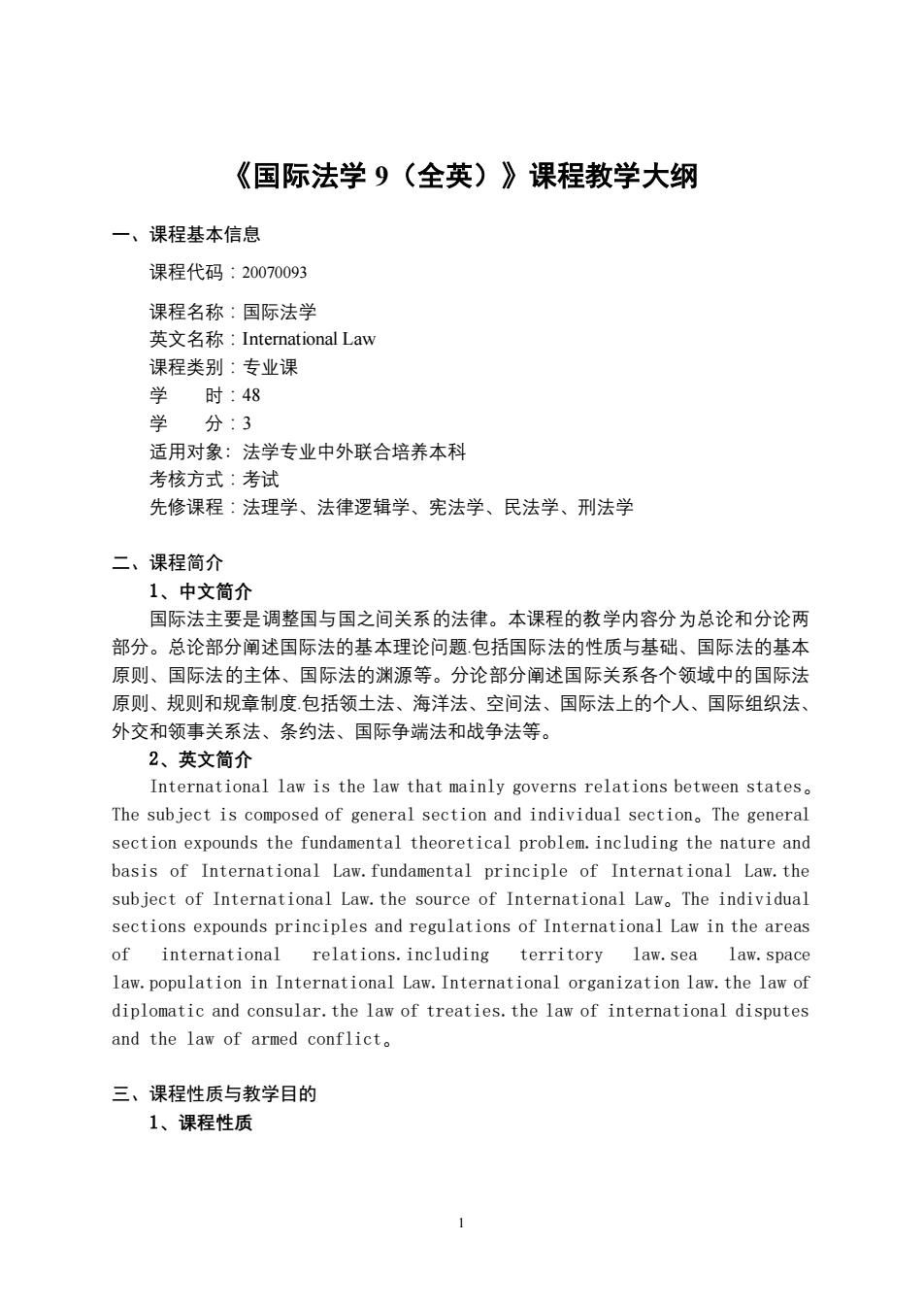
《国际法学9(全英)》课程教学大纲 一、课程基本信息 课程代码:20070093 课程名称:国际法学 英文名称:International Law 课程类别:专业课 时:48 学 分·3 适用对象:法学专业中外联合培养本科 考核方式:考试 先修课程:法理学、法律逻辑学、宪法学、民法学、刑法学 二、课程简介 1、中文简介 国际法主要是调整国与国之间关系的法律。本课程的教学内容分为总论和分论两 部分。总论部分阐述国际法的基本理论问题包括国际法的性质与基础、国际法的基本 原则、国际法的主体、国际法的渊源等。分论部分阐述国际关系各个领域中的国际法 原则、规则和规章制度包括领土法、海洋法、空间法、国际法上的个人、国际组织法、 外交和领事关系法、条约法、国际争端法和战争法等。 2、英文简介 International law is the law that mainly governs relations between states. The subject is composed of general section and individual section.The general section expounds the fundamental theoretical problem.including the nature and basis of International Law.fundamental principle of International Law.the subiect of International law.the source of International law.The individual sections expounds principles and regulations of International Law in the areas of international relations.including territory law.sea law.space law.population in International Law.International organization law.the law of diplomatic and consular.the law of treaties.the law of international disputes and the law of armed conflict 三、课程性质与教学目的 1、课程性质
1 《国际法学 9(全英)》课程教学大纲 一、课程基本信息 课程代码:20070093 课程名称:国际法学 英文名称:International Law 课程类别:专业课 学 时:48 学 分:3 适用对象: 法学专业中外联合培养本科 考核方式:考试 先修课程:法理学、法律逻辑学、宪法学、民法学、刑法学 二、课程简介 1、中文简介 国际法主要是调整国与国之间关系的法律。本课程的教学内容分为总论和分论两 部分。总论部分阐述国际法的基本理论问题.包括国际法的性质与基础、国际法的基本 原则、国际法的主体、国际法的渊源等。分论部分阐述国际关系各个领域中的国际法 原则、规则和规章制度.包括领土法、海洋法、空间法、国际法上的个人、国际组织法、 外交和领事关系法、条约法、国际争端法和战争法等。 2、英文简介 International law is the law that mainly governs relations between states。 The subject is composed of general section and individual section。The general section expounds the fundamental theoretical problem.including the nature and basis of International Law.fundamental principle of International Law.the subject of International Law.the source of International Law。The individual sections expounds principles and regulations of International Law in the areas of international relations.including territory law.sea law.space law.population in International Law.International organization law.the law of diplomatic and consular.the law of treaties.the law of international disputes and the law of armed conflict。 三、课程性质与教学目的 1、课程性质
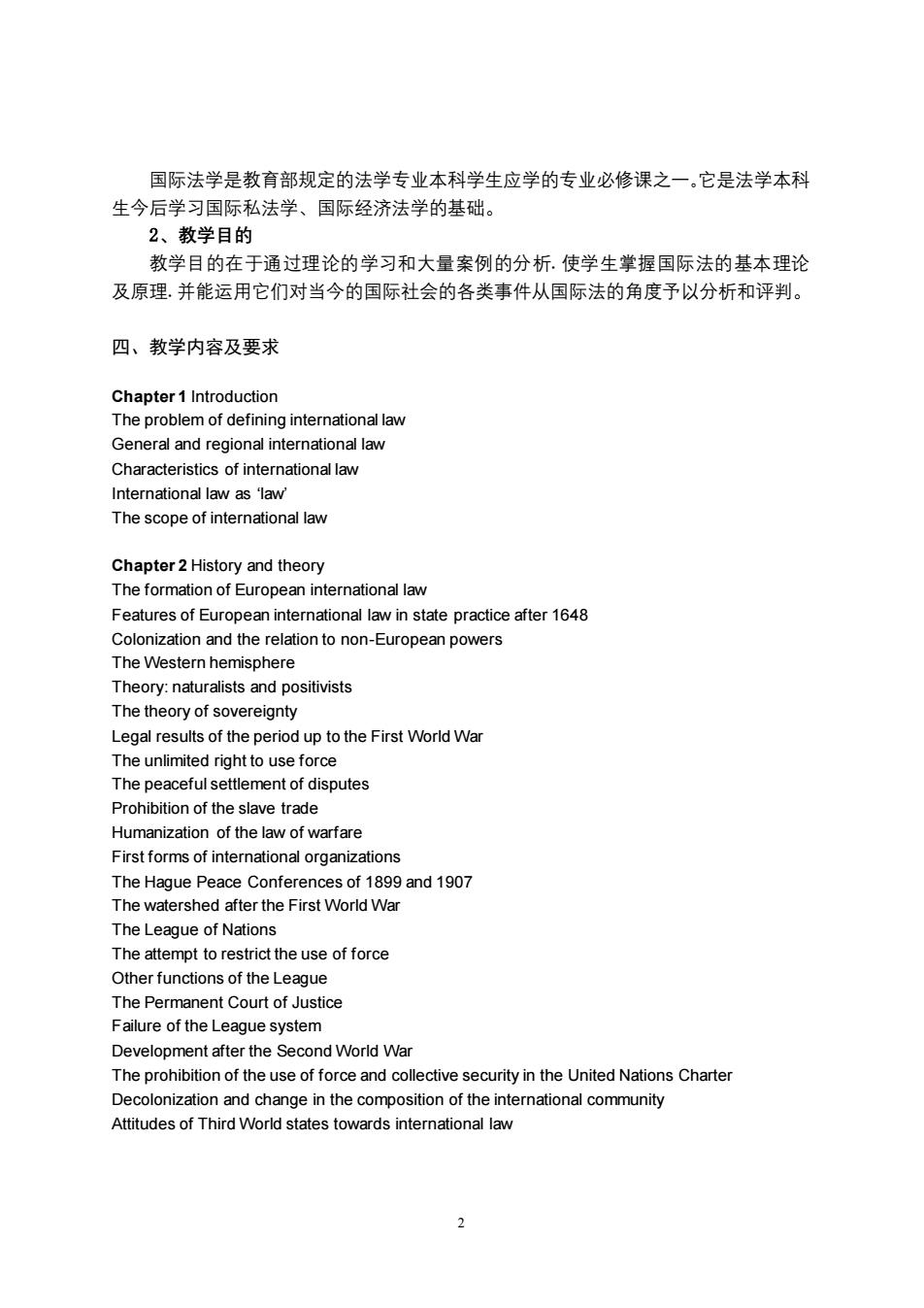
国际法学是教育部规定的法学专业本科学生应学的专业必修课之一。它是法学本科 生今后学习国际私法学、国际经济法学的基础。 2、教学目的 教学目的在于通过理论的学习和大量案例的分析.使学生掌握国际法的基本理论 及原理,并能运用它们对当今的国际社会的各类事件从国际法的角度予以分析和评判。 四、教学内容及要求 Chapter1 Introduction The problem of defining international law General and regional international law Characteristics of international law Chapter 2 History and theory The formation of European international law Features of Europear lw in state practice Coonizaonandheelaiontonon-EUropeanpoers The Western hemisphere Theory:naturalists and positivists The theory of sovereignty The use force The peaceful settlement of disputes Prohibition of the slave trade Humanization of the law of warfare First forms of international organizations s of 1899 and 1907 after the First Wo rld Wa The League of Nations The attempt to restrict the use of force Other functions of the Leaque The permanent court of Justice Failure of the Le system Development after the Second World War The prohibition of the use of force and collective security in the United Nations Charter Decolonization and change in the composition of the international community Attitudes of Third World states towards international law
2 国际法学是教育部规定的法学专业本科学生应学的专业必修课之一。它是法学本科 生今后学习国际私法学、国际经济法学的基础。 2、教学目的 教学目的在于通过理论的学习和大量案例的分析.使学生掌握国际法的基本理论 及原理.并能运用它们对当今的国际社会的各类事件从国际法的角度予以分析和评判。 四、教学内容及要求 Chapter 1 Introduction The problem of defining international law General and regional international law Characteristics of international law International law as ‘law’ The scope of international law Chapter 2 History and theory The formation of European international law Features of European international law in state practice after 1648 Colonization and the relation to non-European powers The Western hemisphere Theory: naturalists and positivists The theory of sovereignty Legal results of the period up to the First World War The unlimited right to use force The peaceful settlement of disputes Prohibition of the slave trade Humanization of the law of warfare First forms of international organizations The Hague Peace Conferences of 1899 and 1907 The watershed after the First World War The League of Nations The attempt to restrict the use of force Other functions of the League The Permanent Court of Justice Failure of the League system Development after the Second World War The prohibition of the use of force and collective security in the United Nations Charter Decolonization and change in the composition of the international community Attitudes of Third World states towards international law
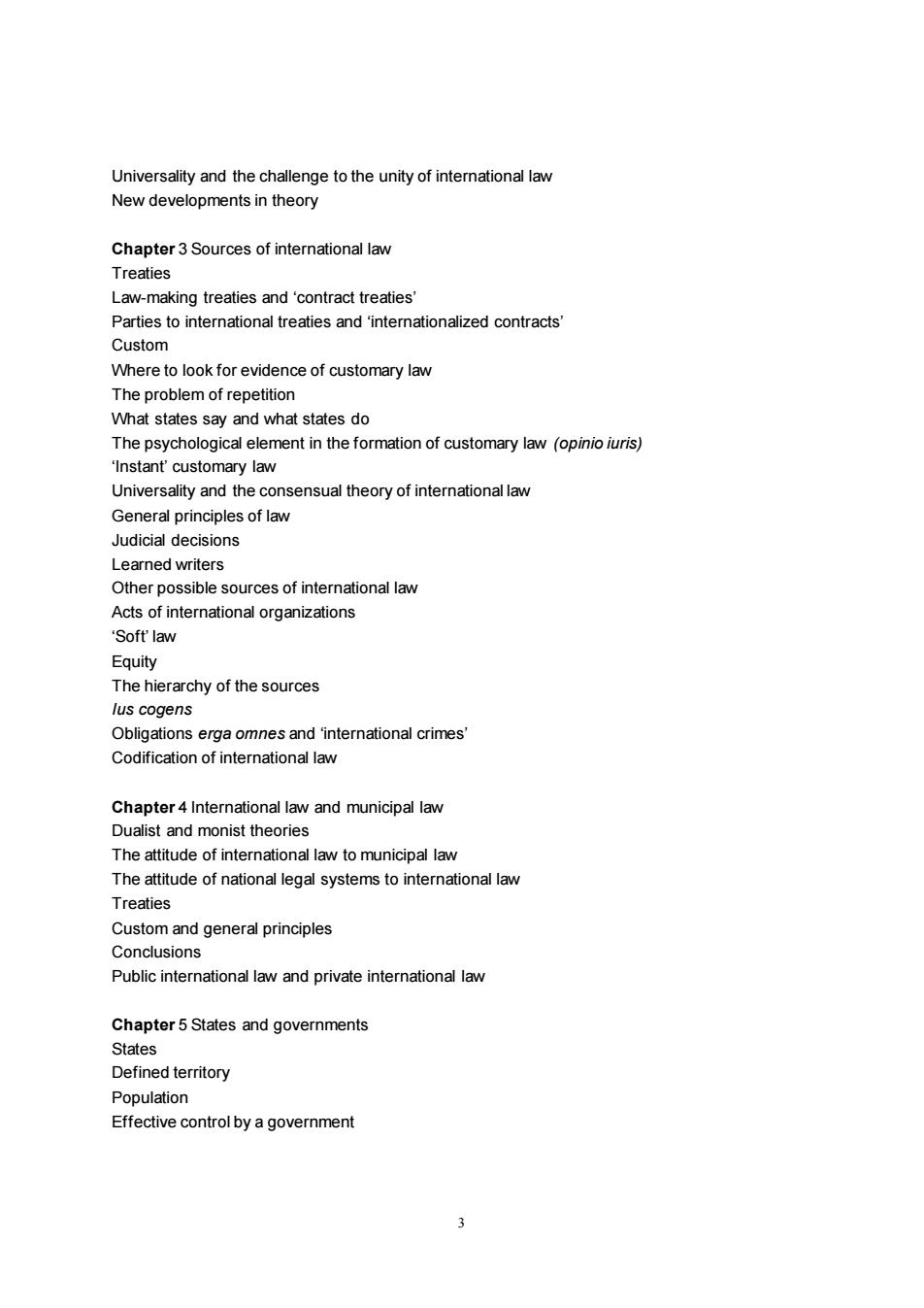
Universality and the challenge to the unity of international law New developments in theory Chapter 3 Sources of international law Law-making treaties and 'contract treaties' Parties to international treaties and 'internationalized contracts' Custom Where to look for evidence of customary law The pro blem of re What state The psychological element in the formation of customary law (opinio iuris) 'Instant'customary law Universality and the consensual theory of international law General principles of lw Learned writers Other possible sources of international law Acts of international organizations 'Soft law Equity The hierarchy of the sources lus cogens Obligations erga omnes and 'international crimes' Codification of international law law and municipal law Dualist and monist theories The attitude of international law to municipal law The attitude of national legal systems to international law Treaties Custom and general principles Conclusions Public international law and private international law chapter 5 states and governments State Defined terriory Population Effective control by a government
3 Universality and the challenge to the unity of international law New developments in theory Chapter 3 Sources of international law Treaties Law-making treaties and ‘contract treaties’ Parties to international treaties and ‘internationalized contracts’ Custom Where to look for evidence of customary law The problem of repetition What states say and what states do The psychological element in the formation of customary law (opinio iuris) ‘Instant’ customary law Universality and the consensual theory of international law General principles of law Judicial decisions Learned writers Other possible sources of international law Acts of international organizations ‘Soft’ law Equity The hierarchy of the sources Ius cogens Obligations erga omnes and ‘international crimes’ Codification of international law Chapter 4 International law and municipal law Dualist and monist theories The attitude of international law to municipal law The attitude of national legal systems to international law Treaties Custom and general principles Conclusions Public international law and private international law Chapter 5 States and governments States Defined territory Population Effective control by a government
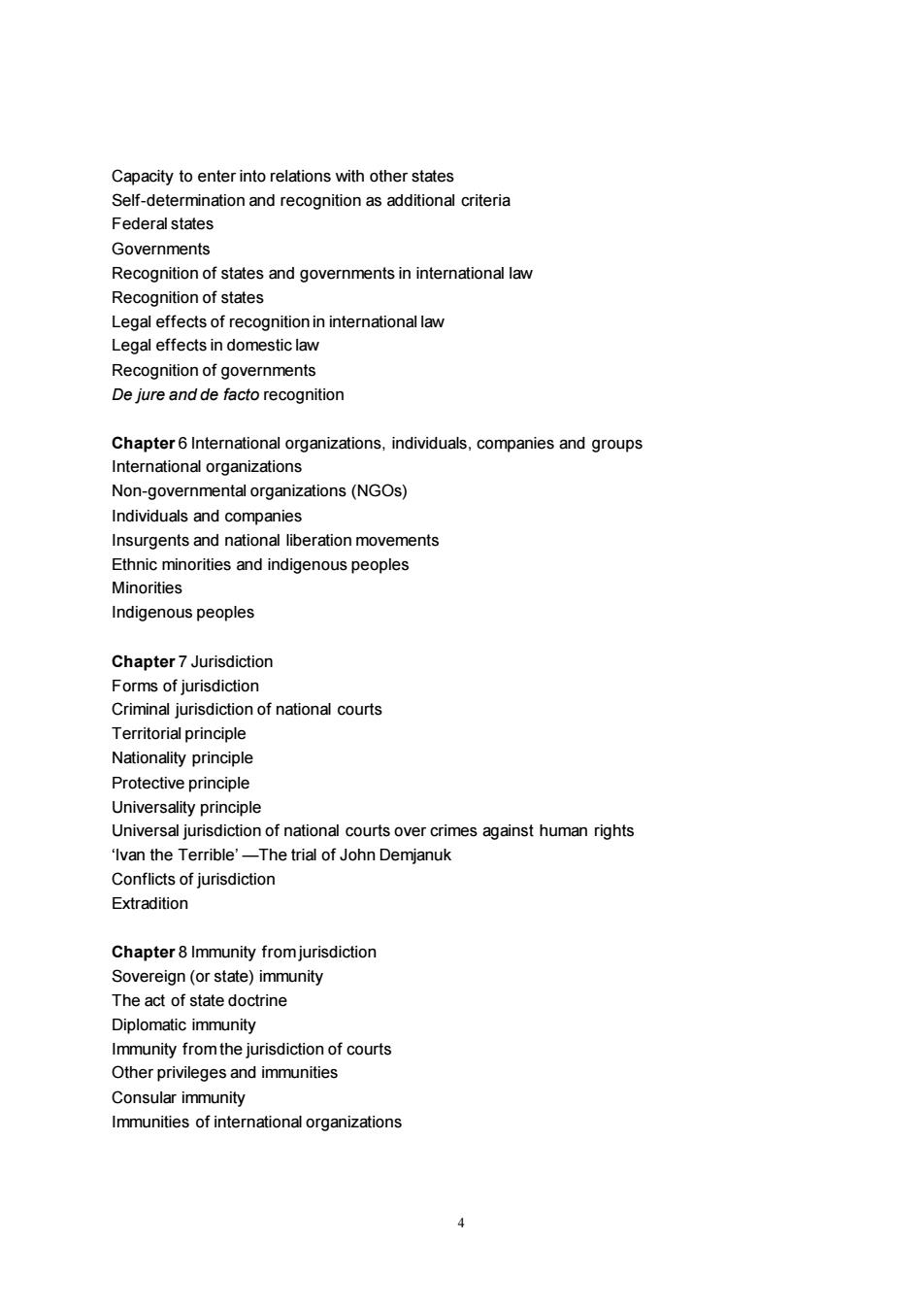
Capacity to enter into relations with other states Self-determination and recognition as additional criteria Federal states Governments Recognition of states and governments in intemational law Recognition of states Legal effects of recognition in international law Legal effects in domestic law Recognition of governments De jure and de acto recognition Chapter6 International organizations,individuals,companies and groups International organizations Non-governmental organizations(NGOs) Individuals and compar Insurgents and national liberation movements Ethnic minorities and indigenous peoples Minorities Indigenous peoples Chapter7Jurisdiction Forms of jurisdiction Criminal jurisdiction of national courts Territorial principle Nationality principle Protective principle Universality principle Universal jurisdiction of national courts over crimes against human rights 'Ivan the Terrible'-The trial of John Demjanuk Conflicts of iurisdiction Extradition Chapter8 Immunity fromjurisdiction Sovereign(or state)immunity The act of state doctrine Diplomatic immunity Immunity from the jurisdiction nof courts Other privileges and immunities Consular immunity Immunities of international organizations
4 Capacity to enter into relations with other states Self-determination and recognition as additional criteria Federal states Governments Recognition of states and governments in international law Recognition of states Legal effects of recognition in international law Legal effects in domestic law Recognition of governments De jure and de facto recognition Chapter 6 International organizations, individuals, companies and groups International organizations Non-governmental organizations (NGOs) Individuals and companies Insurgents and national liberation movements Ethnic minorities and indigenous peoples Minorities Indigenous peoples Chapter 7 Jurisdiction Forms of jurisdiction Criminal jurisdiction of national courts Territorial principle Nationality principle Protective principle Universality principle Universal jurisdiction of national courts over crimes against human rights ‘Ivan the Terrible’ —The trial of John Demjanuk Conflicts of jurisdiction Extradition Chapter 8 Immunity from jurisdiction Sovereign (or state) immunity The act of state doctrine Diplomatic immunity Immunity from the jurisdiction of courts Other privileges and immunities Consular immunity Immunities of international organizations
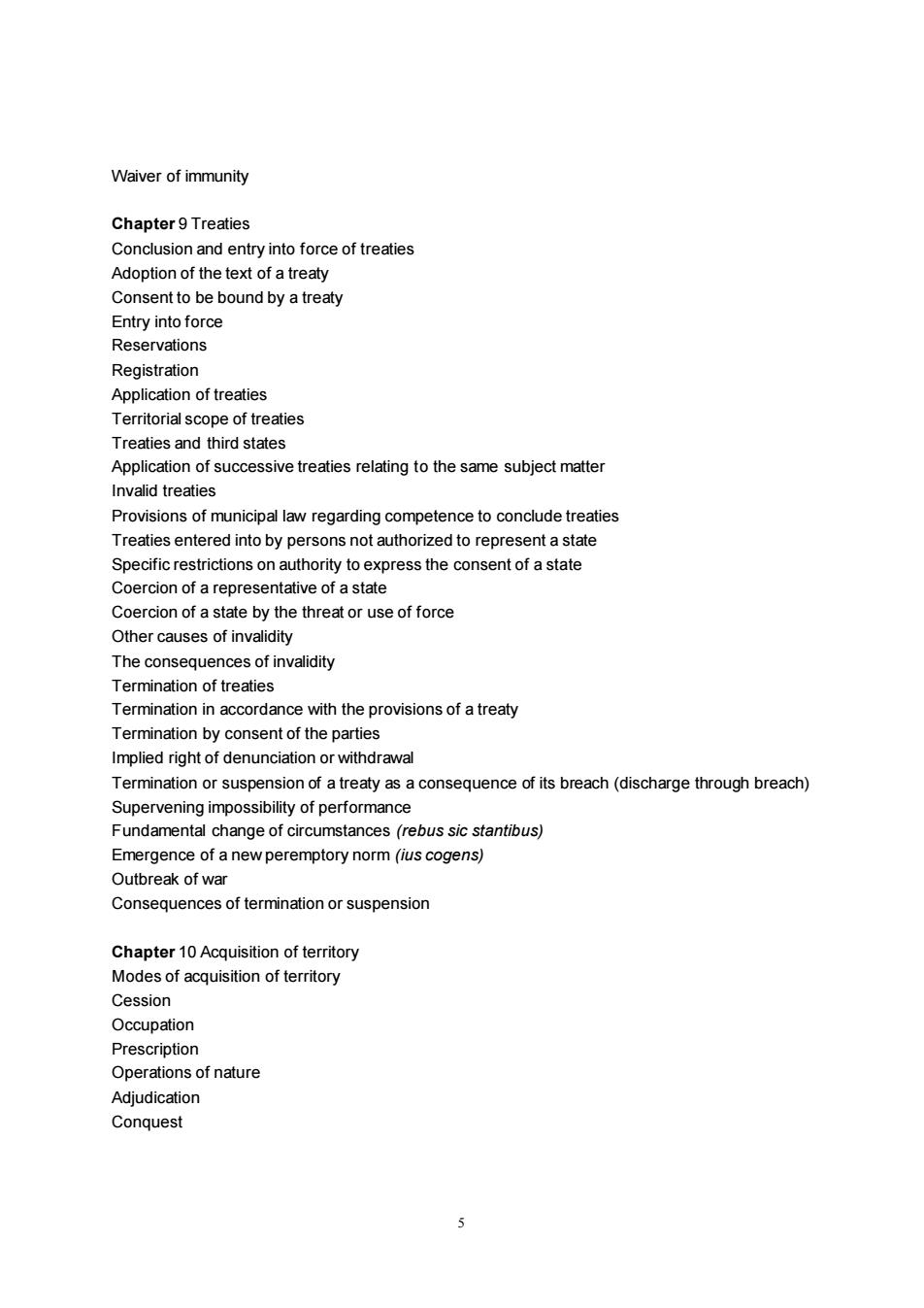
Waiver of immunity Chapter 9 Treaties Conclusion and entry into force of treaties Adoption of the text of a treaty Consent to be bound by a treaty Entry into force Reservations Registration Application of treaties Territorial scope of treaties Treaties and third states Application of successive treaties relating to the same subiect matter Invalid treaties Provisions of municipal lawreg etence to conclude treaties Treaties entered into by persons not authorized to represent a state Specific restrictions on authority to express the consent of a state Coercion of a representative of a state Coercion of a state by the threat or use of force Other causes of invalidity The consequences of invalidity Termination of treaties Termination in accordance with the provisions of a treaty Termination by consent of the parties Implied right of denunciation or withdrawal f sbreach(discharge breach) ervening impossibility of performance Fundamental change of circumstances (rebus sic stantibus) Emergence of a new peremptory norm (ius cogens) Outbreak of war Consequences of termination or suspension Chapter 10 Acquisition of territory Modes of acquisition of territory Cession Occupation Operations o of nature Adjudication Conquest
5 Waiver of immunity Chapter 9 Treaties Conclusion and entry into force of treaties Adoption of the text of a treaty Consent to be bound by a treaty Entry into force Reservations Registration Application of treaties Territorial scope of treaties Treaties and third states Application of successive treaties relating to the same subject matter Invalid treaties Provisions of municipal law regarding competence to conclude treaties Treaties entered into by persons not authorized to represent a state Specific restrictions on authority to express the consent of a state Coercion of a representative of a state Coercion of a state by the threat or use of force Other causes of invalidity The consequences of invalidity Termination of treaties Termination in accordance with the provisions of a treaty Termination by consent of the parties Implied right of denunciation or withdrawal Termination or suspension of a treaty as a consequence of its breach (discharge through breach) Supervening impossibility of performance Fundamental change of circumstances (rebus sic stantibus) Emergence of a new peremptory norm (ius cogens) Outbreak of war Consequences of termination or suspension Chapter 10 Acquisition of territory Modes of acquisition of territory Cession Occupation Prescription Operations of nature Adjudication Conquest

Acquiescence,recognition and estoppel Intertemporal law Legal and political arguments Minor rights over territory Servitudes Chapter 11 Legal consequences of changes of sovereignty over territory(state succession) Treaties Treaties dealing with rights over territory Other types of treaties The principle of 'moving treaty boundaries Decolonization and new states Recent practice Secession Baltic states Dismemberment Soviet Union Yugoslavia Czechoslovakia Unification Germany Yemen International claims Nationality Public property Private property Contractual rights Chapter 12 The law of the sea Internal waters Territorial sea The right of innocent passage Rights of the coastal state over the territorial sea The width of the territorial sea The line from which the territorial sea is measured The contiguous zone Exclusive fishery zones and exclusive economic zone The high seas Interference with ships on the high seas Jurisdiction of municipal courts over crimes committed on the high seas 6
6 Acquiescence, recognition and estoppel Intertemporal law Legal and political arguments Minor rights over territory Servitudes Chapter 11 Legal consequences of changes of sovereignty over territory (state succession) Treaties Treaties dealing with rights over territory Other types of treaties The principle of ‘moving treaty boundaries’ Decolonization and new states Recent practice Secession Baltic states Dismemberment Soviet Union Yugoslavia Czechoslovakia Unification Germany Yemen International claims Nationality Public property Private property Contractual rights Chapter 12 The law of the sea Internal waters Territorial sea The right of innocent passage Rights of the coastal state over the territorial sea The width of the territorial sea The line from which the territorial sea is measured The contiguous zone Exclusive fishery zones and exclusive economic zones The high seas Interference with ships on the high seas Jurisdiction of municipal courts over crimes committed on the high seas
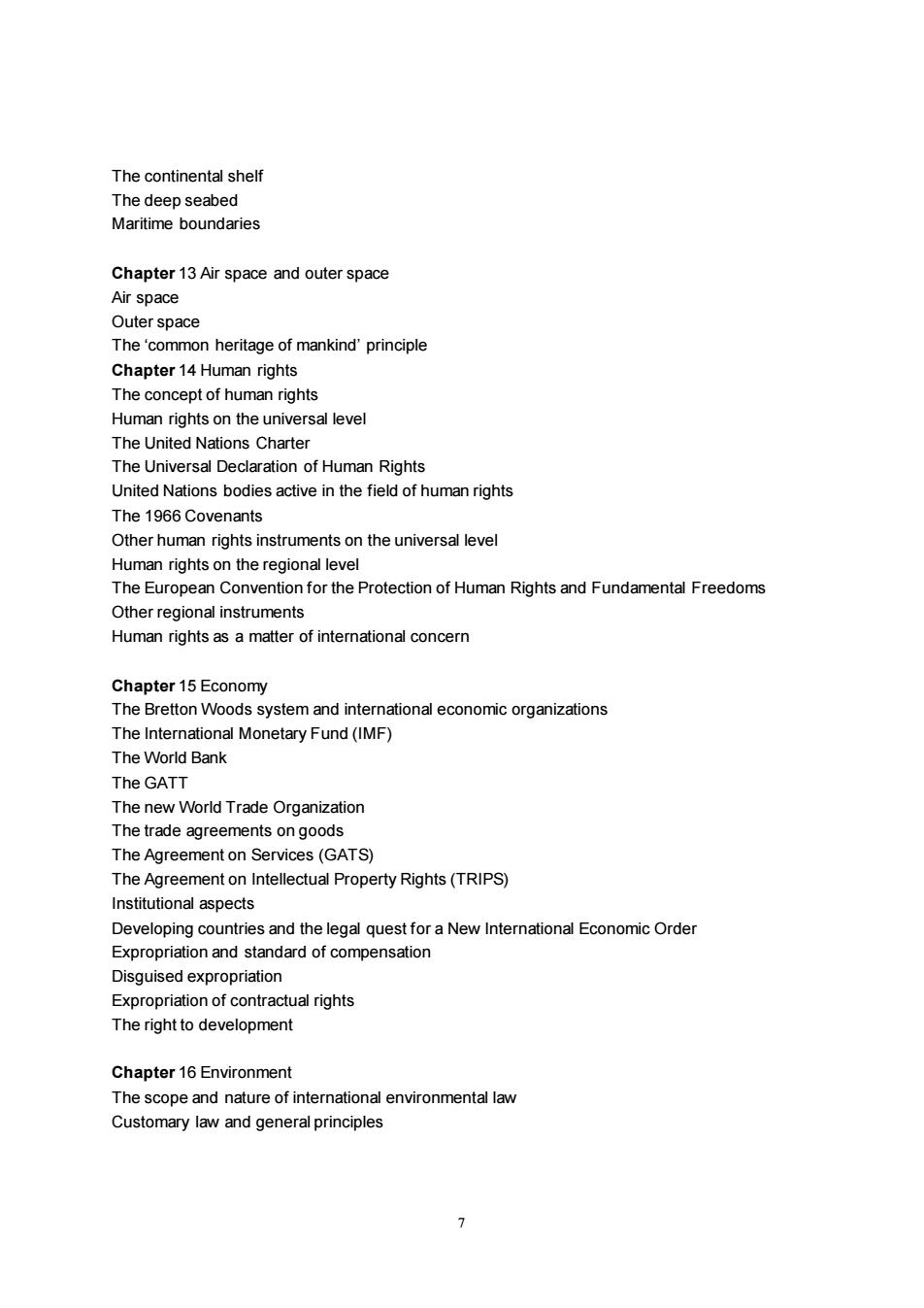
The continental shelf The deep seabed Maritime boundaries Chapter 13 Air space and outer space Air space Outer space The'common heritage of mankind'principle Chapter 14 Human rights The concept of human rights Human rights on the universal leve The United Nations Charter The Universal Declaration of Human Rights United Nations bodies active in the field of human rights The 1966 Covenants Other human rights instruments on the universal leve Human rights on the regional leve The European Convention for the Protection of Human Rights and Fundamental Freedoms Other regional instruments Human rights as a matter of international concern Chapter 15 Economy The Bretton Woods system and international economic organizations The International Monetary Fund(IMF) The World Bank The GATT The new World Trade Organization The trade agreements on goods The Aareement on Services (GATS) The Agreement on Intellectual Property Rights(TRIPS) Institutional aspects Developing countries and the legal quest for a New International Economic Orde Expropriation and standard of compensation Disquised expropriation Expropriation of contractual rights The right to development Chapter 16 Environment The scope and nature of international environmental law Customary law and general principles >
7 The continental shelf The deep seabed Maritime boundaries Chapter 13 Air space and outer space Air space Outer space The ‘common heritage of mankind’ principle Chapter 14 Human rights The concept of human rights Human rights on the universal level The United Nations Charter The Universal Declaration of Human Rights United Nations bodies active in the field of human rights The 1966 Covenants Other human rights instruments on the universal level Human rights on the regional level The European Convention for the Protection of Human Rights and Fundamental Freedoms Other regional instruments Human rights as a matter of international concern Chapter 15 Economy The Bretton Woods system and international economic organizations The International Monetary Fund (IMF) The World Bank The GATT The new World Trade Organization The trade agreements on goods The Agreement on Services (GATS) The Agreement on Intellectual Property Rights (TRIPS) Institutional aspects Developing countries and the legal quest for a New International Economic Order Expropriation and standard of compensation Disguised expropriation Expropriation of contractual rights The right to development Chapter 16 Environment The scope and nature of international environmental law Customary law and general principles
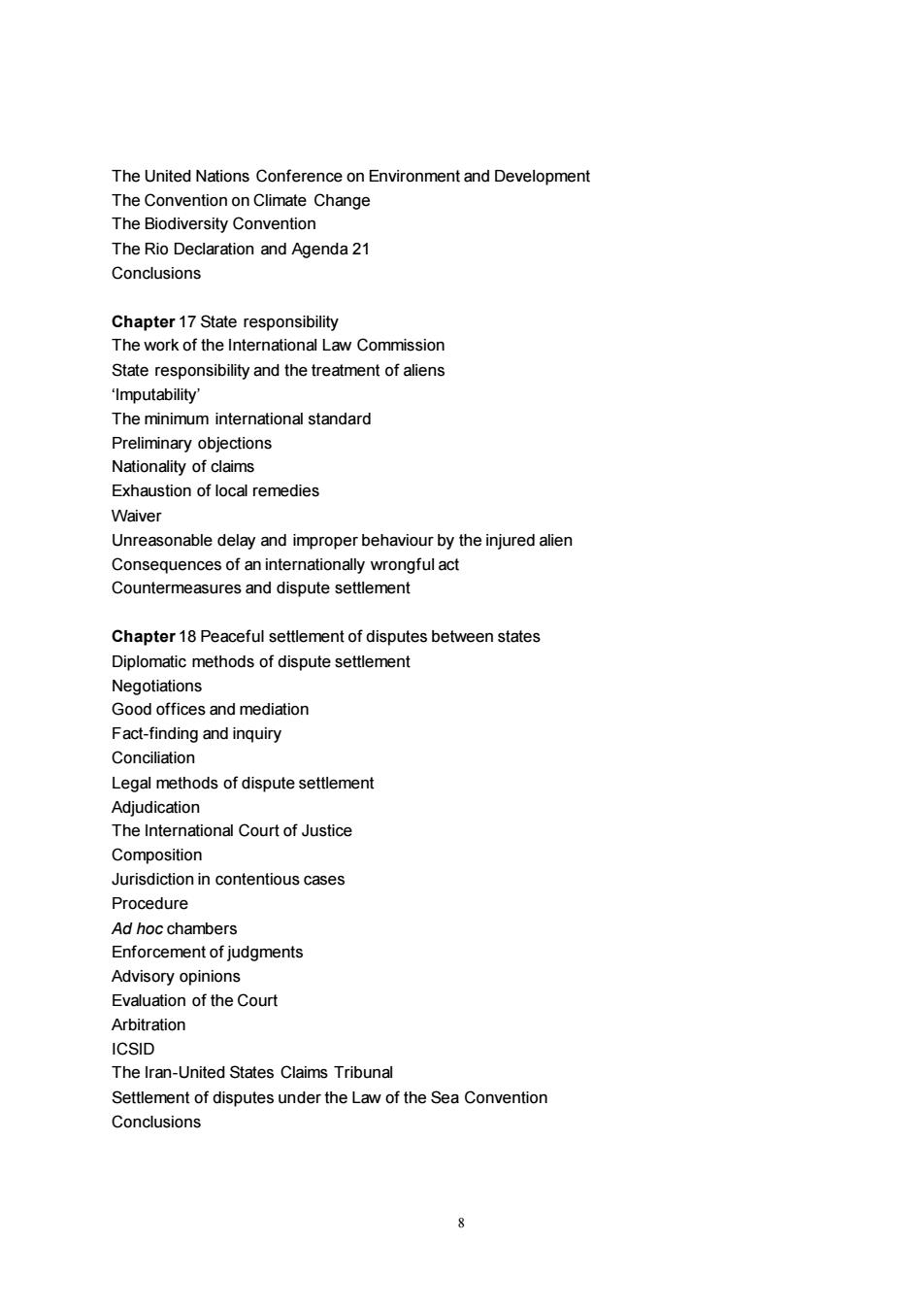
The United Nations Conference on Environment and Development The Convention on Climate Change The Biodiversity Convention The Rio Declaration and Agenda 21 Conclusions Chapter 17 State responsibility The work of the International Law Commission State responsibility and the treatment of aliens The minimum international standard Preliminary objections Nationality of claims Exhaustion of local remedies Waiver Unreasonable delay and improper behaviour by the injured alien Consequences of an internationally wrongful act Countermeasures and dispute settlement Chapter18 Peaceful settlement of disputes between states Diplomatic methods of dispute settlemen Negotiations Good offices and mediation Fact-finding and inquiry Conciliation Legal methods of dispute settlemen Adjudication The International Court of Justice Composition Jurisdiction in contentious cases Procedure Ad hoc chambers Enforcement of judgments Advisory opinions Evaluation of the Court Arbitration ICSID The Iran-United States Claims Tribunal Settlement of disputes under the Law of the Sea Convention Conclusions
8 The United Nations Conference on Environment and Development The Convention on Climate Change The Biodiversity Convention The Rio Declaration and Agenda 21 Conclusions Chapter 17 State responsibility The work of the International Law Commission State responsibility and the treatment of aliens ‘Imputability’ The minimum international standard Preliminary objections Nationality of claims Exhaustion of local remedies Waiver Unreasonable delay and improper behaviour by the injured alien Consequences of an internationally wrongful act Countermeasures and dispute settlement Chapter 18 Peaceful settlement of disputes between states Diplomatic methods of dispute settlement Negotiations Good offices and mediation Fact-finding and inquiry Conciliation Legal methods of dispute settlement Adjudication The International Court of Justice Composition Jurisdiction in contentious cases Procedure Ad hoc chambers Enforcement of judgments Advisory opinions Evaluation of the Court Arbitration ICSID The Iran-United States Claims Tribunal Settlement of disputes under the Law of the Sea Convention Conclusions
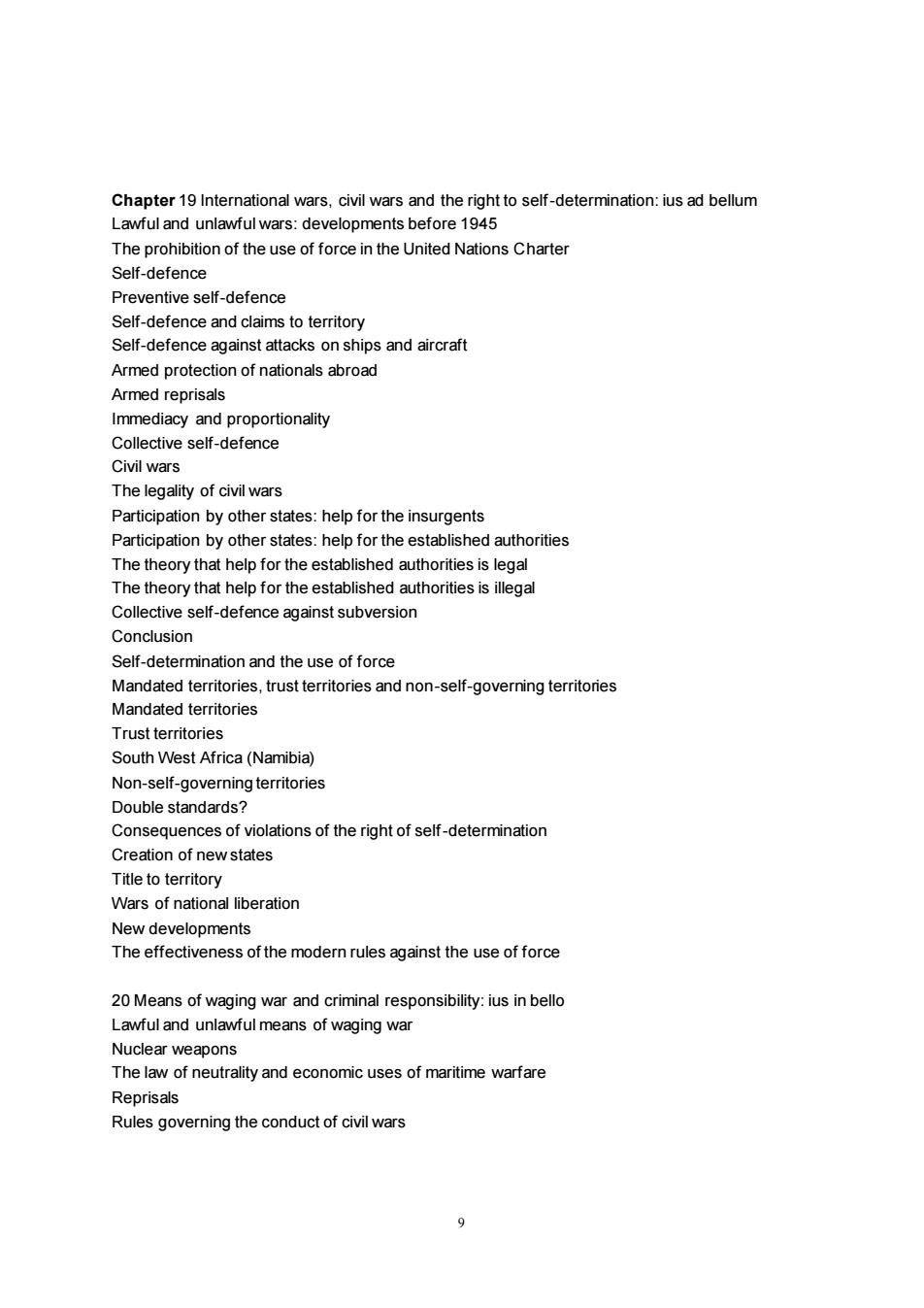
Chapter 19 International wars,civil wars and the right to self-determination:ius ad bellum Lawful and unlawful wars:developments before 1945 The prohibition of the use of force in the United Nations Charter Self-defence Preventive self-defence Self-defence and claims to territory Self-defence against attacks on ships and aircraft Armed protection of nationals abroad Armed reprisals Immediacy and proportionality Collective self-defence Civil wars The legality of civil wars Participation by other states:help for the ins hed authoritie The theory that help for the established authorities is legal The theory that help for the established authorities is illegal Collective self-defence against subversion Conclusion Self-determination and the use of force Mandated territories,trust territories and non-self-governing territories Mandated territories Trust territories South West Africa (Namibia) Consequences of violations of the right of self-determination Creation of new states Title to territory Wars of national liberation New developments The effectiveness of the modern rules against the use of force 20 Means of waging war and criminal responsibility:ius in bello Lawful and unlawful means of waging war eapons The law of neutrality and economic uses of maritime warfare Reprisals Rules governing the conduct of civil wars
9 Chapter 19 International wars, civil wars and the right to self-determination: ius ad bellum Lawful and unlawful wars: developments before 1945 The prohibition of the use of force in the United Nations Charter Self-defence Preventive self-defence Self-defence and claims to territory Self-defence against attacks on ships and aircraft Armed protection of nationals abroad Armed reprisals Immediacy and proportionality Collective self-defence Civil wars The legality of civil wars Participation by other states: help for the insurgents Participation by other states: help for the established authorities The theory that help for the established authorities is legal The theory that help for the established authorities is illegal Collective self-defence against subversion Conclusion Self-determination and the use of force Mandated territories, trust territories and non-self-governing territories Mandated territories Trust territories South West Africa (Namibia) Non-self-governing territories Double standards? Consequences of violations of the right of self-determination Creation of new states Title to territory Wars of national liberation New developments The effectiveness of the modern rules against the use of force 20 Means of waging war and criminal responsibility: ius in bello Lawful and unlawful means of waging war Nuclear weapons The law of neutrality and economic uses of maritime warfare Reprisals Rules governing the conduct of civil wars
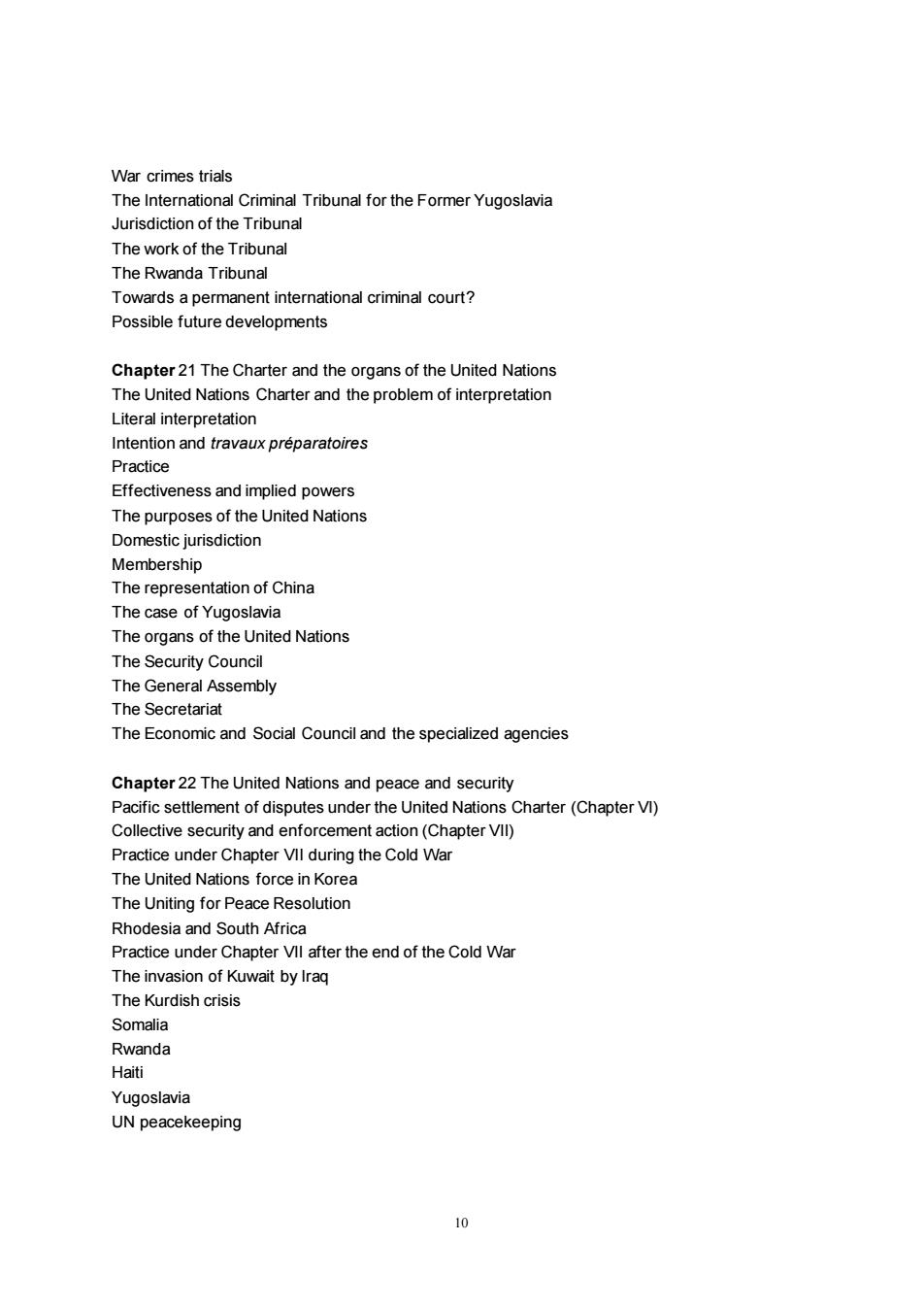
War crimes trials The International Criminal Tribunal for the Former Yugoslavia Jurisdiction of the Tribunal The work of the Tribunal The Rwanda Tribunal Towards a permanent international criminal court? Possible future developments Chapter21The Charter and the organs of the United Nations The United Nations Charter and the problem of interpretation Literal interpretation Intention and travaux preparatoires Practice Effectiveness and implied powers The purposes of the United Nation Domestic jurisdiction Membership The representation of China The case of Yugoslavia The organs of the United Nations The Security Council The General Assembly The Secretariat The Economic and Social Council and the specialized agencies Chapter22 The United Nations and peace and security Pacific settlement of disputes under the United Nations Charter(Chapter VI) Collective security and enforcement action(Chapter VIl) Practice under Chapter VII during the Cold War The United Nations force in Korea The Uniting for Peace Resolution Rhodesia and South Africa Practice under Chapter VII after the end of the Cold War The invasion of Kuwait by Irag The Kurdish crisis Somalia anda Hai Yugoslavia UN peacekeeping
10 War crimes trials The International Criminal Tribunal for the Former Yugoslavia Jurisdiction of the Tribunal The work of the Tribunal The Rwanda Tribunal Towards a permanent international criminal court? Possible future developments Chapter 21 The Charter and the organs of the United Nations The United Nations Charter and the problem of interpretation Literal interpretation Intention and travaux préparatoires Practice Effectiveness and implied powers The purposes of the United Nations Domestic jurisdiction Membership The representation of China The case of Yugoslavia The organs of the United Nations The Security Council The General Assembly The Secretariat The Economic and Social Council and the specialized agencies Chapter 22 The United Nations and peace and security Pacific settlement of disputes under the United Nations Charter (Chapter VI) Collective security and enforcement action (Chapter VII) Practice under Chapter VII during the Cold War The United Nations force in Korea The Uniting for Peace Resolution Rhodesia and South Africa Practice under Chapter VII after the end of the Cold War The invasion of Kuwait by Iraq The Kurdish crisis Somalia Rwanda Haiti Yugoslavia UN peacekeeping